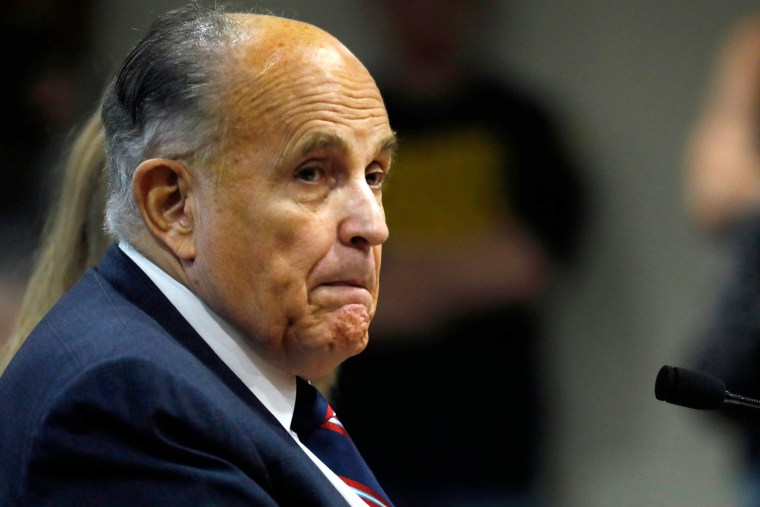It was just two days ago when Rudy Giuliani was greeted with federal investigators who were executing a search warrant to enter his apartment and seize electronic devices. It's led to all kinds of speculation about a possible criminal indictment, though the former New York City mayor has denied any wrongdoing.
But what's been less obvious is what, exactly, the federal investigation entails. As the New York Times, which was first to report on the search warrant, explained on Wednesday, "It is a federal crime to try to influence or lobby the United States government at the request or direction of a foreign official without disclosing it to the Justice Department. At least one of the search warrants for Mr. Giuliani's devices explicitly stated that the possible crimes under investigation included violations of that law, the Foreign Agents Registration Act."
If, for example, the Justice Department had evidence of Giuliani trying to influence the Trump administration's foreign policy toward Ukraine because of his associates' interests, and the Republican lawyer then failed to disclose his lobbying, that could lead to charges.
Overnight, the New York Times brought the allegations into sharper focus.
Two years ago, Rudolph W. Giuliani finally got one thing he had been seeking in Ukraine: The Trump administration removed the U.S. ambassador there, a woman Mr. Giuliani believed had been obstructing his efforts to dig up dirt on the Biden family. It was a Pyrrhic victory. Mr. Giuliani's push to oust the ambassador, Marie L. Yovanovitch, not only became a focus of President Donald J. Trump's first impeachment trial, but it has now landed Mr. Giuliani in the cross hairs of a federal criminal investigation into whether he broke lobbying laws, according to people with knowledge of the matter.
The article helps make sense of why Giuliani has found himself in such hot water.
Some of these elements came into view a couple of years ago, during the first of Donald Trump's two impeachments. Indeed, in 2019, Giuliani was surprisingly candid when describing his efforts to derail Yovanovitch's career in Ukraine, explaining that he effectively ran a foreign operation against the American ambassador.
The New York Times' report published overnight explained the significance of Giuliani's motivations for having targeted her.
The warrant also sought his communications with Ukrainian officials who had butted heads with Ms. Yovanovitch, including some of the same people who at the time were helping Mr. Giuliani seek damaging information about President Biden, who was then a candidate, and his family, the people said. At issue for investigators is a key question: Did Mr. Giuliani go after Ms. Yovanovitch solely on behalf of Mr. Trump, who was his client at the time? Or was he also doing so on behalf of the Ukrainian officials, who wanted her removed for their own reasons?
The worrisome scenario is relatively straightforward: with Yovanovitch, the United States had a strong and capable ambassador in Ukraine. Corrupt players in Ukraine saw her as an obstacle -- precisely because of Yovanovitch's anti-corruption stance -- and they came to believe they could force her ouster by partnering with Giuliani and trying to help Donald Trump's re-election campaign.
Or as the Times' report put it, "Even if the Ukrainians did not pay Mr. Giuliani, prosecutors could pursue the theory that they provided assistance by collecting information on the Bidens in exchange for her removal."
Watch this space.

